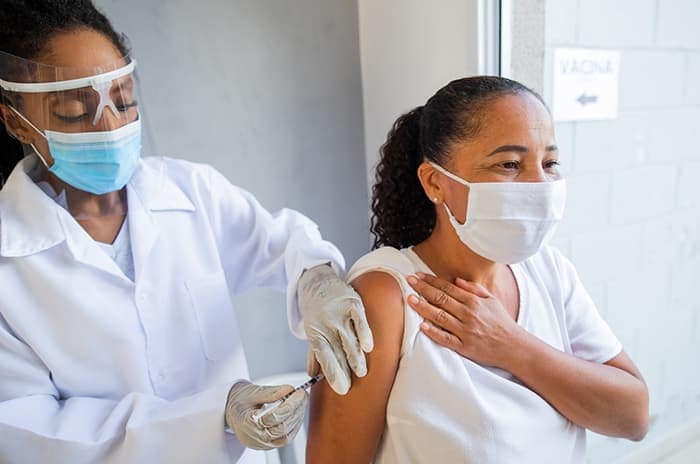COVID-19 and Cancer Deaths

Cancer survivors may have a higher risk of getting very sick if they get COVID-19, but they can take steps to protect their health.
The number of people with cancer who died from another cause was highest during peaks in COVID-19 infection in 2021 and 2022.
A cancer survivor is a person who has been diagnosed with cancer. A person is considered a cancer survivor from the time of diagnosis throughout the rest of their life.
Cancer survivors are more likely than others to get very sick or die if they get COVID-19. They may have a weakened immune system because of their cancer or cancer treatment. Because leukemia, lymphoma, myeloma, and other blood cancers develop in the immune system, people living with these cancers tend to have weakened immune systems. Chemotherapy can damage the immune system by killing white blood cells that fight infections.
CDC scientists wanted to find out if COVID-19 caused more cancer survivors to die.
How the Study Was Done
CDC scientists looked at deaths reported to CDC’s National Vital Statistics System from January 1, 2018 through July 2, 2022. They looked at reports of people who died with cancer as the underlying cause of death or a contributing cause on their death certificate.
- Underlying cause of death is the one disease or injury that started the chain of events leading to death.
- Contributing causes of death are other diseases or conditions that made the underlying cause of death worse or made the person more likely to die.
Scientists estimated the percentages of cancer deaths by week, age, sex, cancer type, and racial and ethnic group.
What the Study Found
The number of cancer deaths with cancer as the underlying cause increased slightly from 2018 to 2021, but less than the increase in the number of deaths from cancer as any cause of death. This shows that more people with cancer died from COVID-19 and other diseases. The number of cancer deaths due to other underlying causes was highest in the winter of 2021 and 2022, when more people were infected with COVID-19.
Scientists found a higher percentage of cancer deaths with COVID-19 as the underlying cause among Hispanic and Latino, non-Hispanic American Indian and Alaska Native, and non-Hispanic Black people compared with members of other racial and ethnic groups. They also found that—
- On average, about 13,000 deaths each week listed cancer as the underlying cause or a contributing cause.
- From 2018 to 2021, the number of cancer deaths increased 4.7%. The number of deaths with cancer as the underlying cause increased 1.0%.
- From 2020 to 2022, the number of cancer deaths each week with COVID-19 as the underlying cause ranged from 28 to 1,055. This number was highest in January 2022 (1,055) and January 2021 (953).
- From 2020 to 2022, the number of cancer deaths each week with COVID-19 as a contributing cause ranged from 10 to 463. This number was highest in January 2022 (463) and January 2021 (242).
- The percentage of cancer deaths with cancer as the underlying cause was 90% in 2018 and 2019, 88% in 2020, and 87% in 2021.
Of cancer deaths with COVID-19 as the underlying cause in 2021—
- A higher percentage occurred among males (2.6%) than females (2.1%).
- A higher percentage occurred among people who were 65 or older (2.4% or higher) than among those who were 15 to 64 (1.5% to 2.1%).
- A higher percentage occurred among non-Hispanic American Indian and Alaska Native people (3.4%), Hispanic and Latino people (3.2%), and non-Hispanic Black people (2.5%) compared with members of other racial and ethnic groups (1.5% to 2.3%).
- A higher percentage occurred among people with blood cancer (7.4% for leukemia, 7.3% for non-Hodgkin lymphoma, and 5.8% for myeloma deaths) compared with other types of cancer (0.6% for pancreatic cancer, 2.8% for breast cancer, and 3.6% for prostate cancer deaths).
Why This Matters
Cancer survivors may have a higher risk of getting very sick if they get COVID-19, but they can take steps to protect their health. For example, they can—
- Be sure they are up to date with COVID-19 vaccines.
- Ask people who live with or care for them to get COVID-19 vaccines as well.
- Take medicine to help prevent getting very sick with COVID-19 or get treated if they get COVID-19.
Citation
Henley SJ, Dowling NF, Ahmad FB, Ellington TD, Wu M, Richardson LC. COVID-19 and other underlying causes of cancer deaths—United States, January 2018–July 2022. MMWR 2022.